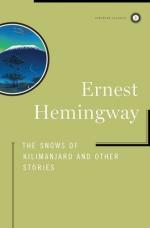|
This section contains 1,735 words (approx. 6 pages at 300 words per page) |

|
SOURCE: "The Snows of Kilimanjaro': Harry's Second Chance," in Studies in Short Fiction, Vol. V, No. 1, Fall, 1967, pp. 54-9.
In the following essay, Dussinger emphasizes the significance of the final death scene of "The Snows of Kilimanjaro, " concluding that this scene validates the protagonist's quest for truth and identity.
The similarity of Harry's memories in "The Snows of Kilimanjaro" to those of Hemingway in A Moveable Feast reveals the autobiographical intensity of this short story. When Hemingway speaks through his protagonist, "He had seen the world change. . . . He had been in it and he had watched it and it was his duty to write of it. . .," he makes clear that Harry's story is his professional manifesto. In his narration of the experiences of a dying man, Hemingway proves by example the one thing needful to the writer's pursuit of his hallowed calling. Hemingway embodies in "The Snows of...
|
This section contains 1,735 words (approx. 6 pages at 300 words per page) |

|


